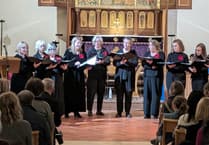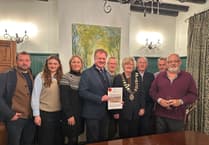The van Kuijk Quartet made a welcome return to Haslemere for the HHH concert on November 19.
Their opening piece, the String Quartet by Henriëtte Bosmans, reflected the uncertain pre-war times of its composition. She was an important figure in Dutch music who made a Europe-wide career as a concert pianist but during the Nazi occupation she could no longer play in public and focused on composing.
The solo viola immediately captured the audience with a short pastoral tune, but the safe, country landscape it depicted gradually became alarming. Falling cadences in the slow second movement heightened the anxiety. The unpredictable phrases stopped and started on a sixpence. In the final movement, resolute sweeping chords in the violins are met by blunt chopped or pizzicato responses, then they swap roles.
When the finale, rattling along like a juggernaut, came to a sudden full stop, the palpable menace still hung in the air.
Mendelssohn’s String Quartet in A minor also started urbane and reassuring, but soon became more turbulent, the violins darting after each other like gusts of wind in all directions. The adagio’s broad, measured chords invited the instruments to enter in turn, and ask a question. The first violin seems to have an answer, the cello contradicts.
The intermezzo opened with a stately Polish dance, then an elfin scherzo slipped in. An impassioned Presto heralded first a fugue next a heart-rending violin solo, before closing the circle with the theme from the start.
After the interval the quartet were joined by substitute mezzo soprano Marta Fontanals-Simmons. They began with Samuel Barber’s Dover Beach. It starts out recalling a honeymoon scene of a moonlit beach. The singer’s voice holds the calm of the sea, while the subdued restlessness of the waves is heard in the strings.
It is easier for a deeper baritone to stand out than a mezzo voice, closer in pitch to the strings. However, as the song expanded, Marta’s voice soon became clearer, revealing immense warmth and expression.
Maurice Ravel’s Schéhérazade is a cycle of three songs. They are settings of contemporary poems with an oriental setting, but otherwise little connection to the Arabian Nights. Marta captured lovingly the move “from rich voluptuousness and gentle lyricism to languid sensuousness”. The quartet displayed throughout the ravishing sound which is their hallmark. As a contrasting encore, the appreciative audience were treated to Kurt Weill’s gripping Youkali.
Martin Robson





Comments
This article has no comments yet. Be the first to leave a comment.